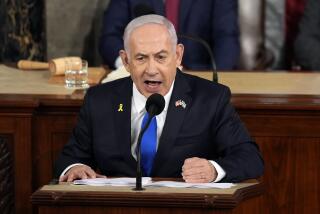Yeltsin Heaps Criticism on Russian Lawmakers : Congress: As session ends, the president claims victory but calls hard-liners ‘uncivilized.’
- Share via
MOSCOW — President Boris N. Yeltsin closed a grueling 14-day session of Russia’s highest legislative body Tuesday by chastising lawmakers for leaving the country with a constitutional crisis and without a desperately needed land reform program.
While criticizing the Congress of People’s Deputies, the national Parliament, for trying to sabotage his radical reforms, Yeltsin made it clear he considers himself--and his reforms--victorious.
The central issue of the Congress was a bitter power struggle between Yeltsin’s radical government and the Parliament, which was elected two years ago and is much more conservative.
Yeltsin’s team of ministers had threatened to resign because of the dispute, but through behind-the-scenes maneuvering, Yeltsin, who also holds the job of prime minister, managed to preserve his government’s power and avoid what would have been a major setback for Russia’s reforms.
He said lawmakers’ “uncivilized” conduct had sparked panic at home and put at risk pledges of billions of dollars of Western aid, which Russia needs to change its terminally ill socialist economy into a healthy free-market system.
“It is highly embarrassing when angry and openly provocative phraseology--full of hatred and arrogance--resounds throughout the world from the hall where the supreme legislative body of Russia is in session,” Yeltsin fumed. “This phraseology not only destabilizes life in Russia but also complicates our dialogues with near and distant foreign countries.”
All the time spent on mudslinging, Yeltsin said, had kept them from making necessary decisions on essential economic issues such as land reform.
Yeltsin did, however, praise lawmakers for finding “the strength in themselves to oppose attempts at a conservative revenge” by Communist hard-liners.
Had their “all-out attack” succeeded, it would have been “equal to a suicide” for the country’s reforms, he said.
But the peace reached between the executive and legislative branches is “only a fragile compromise,” Yeltsin warned.
The situation is especially shaky, he said, because the Congress failed to pass a new constitution, which would have separated powers in the branches of government.
Before the Congress opened, top government officials predicted that it would adopt, at least in principle, a new democratic Russian constitution to replace the existing Soviet-era document.
Instead, the Congress merely amended the old constitution, which has been in effect since 1978.
“This fundamental law is infinitely outdated,” Yeltsin said. Attempts to bring the old document into line through amendments, he added, failed miserably.
Conservative lawmakers managed to preserve references to the Soviet Union in the constitution’s preamble and in three articles, despite pleas by Ruslan I. Khasbulatov, chairman of the Supreme Soviet, the national legislature, and Speaker of Congress.
“Members of the Commonwealth are accusing us already of imperial ambitions. . . . I appeal to your consciences,” Khasbulatov begged lawmakers. “Let us not cover ourselves with shame.”
Nonetheless, the constitution still requires that Russia support the Soviet military, which no longer exist, and abide by Soviet laws.
He called for both sides to give up the power struggle and cooperate for the sake of the country.
Yeltsin challenged the Congress to stop attempts to “bring down the government.”
“Without the executive power there will be no reforms, no order, no statehood which Russia, its history and traditions deserve,” Yeltsin said.
For his part, Yeltsin said the executive is ready to submit to the legislature proposals on adjusting its economic reform plan in response to lawmakers’ criticisms that the reforms provide no safety net for the poor and do not stimulate the country’s rapidly declining industrial production.
It will also give lawmakers a say in choosing ministers and the authority to assess the performance of government officials.
“In the event that the Parliament considers the performance of some members of the government unsatisfactory, the president shall dismiss such ministers,” Yeltsin said.
After hearing Yeltsin’s speech, Khasbulatov--a ringleader of the attack on the government earlier in the session--said the Parliament will do its best to cooperate with Yeltsin and the government.
But it was already clear that Yeltsin’s government has not seen its last battle with the Congress, whose members are, for the most part, former Communists.
Nikolai Pavlov, a leader of the opposition bloc Yedinstvo, said Yeltsin cannot hope to get the cooperation he wants unless he makes life easier for the people.
“The (government’s) current reform strategy is absolutely unacceptable,” Pavlov said. “And if it is not changed, the relationship between the government and the legislature will be extremely aggravated by the next Congress.”
In the summation of his speech, however, Yeltsin stressed his conviction that his government will persevere.
“Russia has been awakened,” Yeltsin said. “It is moving toward a market economy and normal life, despite difficulties and obstacles on this path. The course of history is irreversible.”
Viktor Grebenshikov, a reporter in The Times’ Moscow bureau, contributed to this report.
More to Read
Sign up for Essential California
The most important California stories and recommendations in your inbox every morning.
You may occasionally receive promotional content from the Los Angeles Times.













